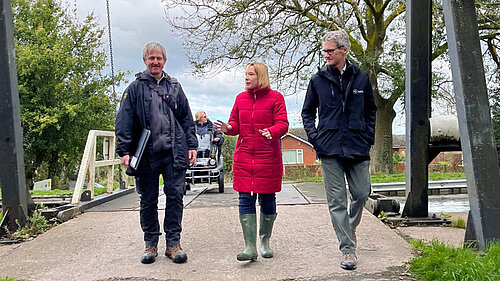Helen talks flood management on Whixhall Moss visit

North Shropshire MP Helen Morgan has visited Whixall Moss to discuss the innovative environmental and flood management work taking place in the area.
The MP met with representatives from Shropshire Wildlife Trust and Natural England as she continues to campaign for better water and flood controls across Shropshire and rural areas in general.
The Whixall Moss BogLIFE project aimed to restore Britain’s third-largest lowland raised bog within the Fenn’s, Whixall and Bettisfield Mosses. It was funded by Natural England, working closely with Shropshire Wildlife Trust, with an overarching ambition of restoring 556 hectares of bog and edge habitat.
The project already has a number of successes. Water voles have spread to new habitats, waved fork-moss (one of the rarest bog plans) is thriving, snipe returned to breed after 30 years, and the curlew population now appears stable. Rewetting the land has also already reduced net annual CO2 emissions by 390 tonnes.
The bog is also holding water for longer, which helps moderate flooding in the Roden – a topical issue given issues many parents and children had getting to Whixall Primary School last week during heavy rain.
Helen also spoke with the team about their future plans, including at Deepdale Bungalow and works to sequestrate carbon.
Helen Morgan, Liberal Democrat MP for North Shropshire, said, “The work done by the team managing the Fenn’s, Whixall and Bettisfield Mosses is incredible.
“It’s really important that new techniques are explored if we are to manage water properly and minimise the impact of flooding in places like Shropshire.
“Water voles have spread to new habitats, rare bog plants are thriving, snipe have returned to breed after 30 years, and the curlew population is stable. The bogland is also now holding water for longer, which helps to moderate flooding in the Roden.
“Thank you to Shropshire Wildlife Trust and Natural England for taking the time to show me around, and to talk through their ambitions to make Whixhall Moss an even more sustainable home for wildlife and part of Shropshire’s ecosystem.”
